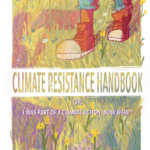Handouts: Exxon knew
Introduce: “The scientists aren’t the only ones who know that climate change is being caused by human greenhouse gas emissions — even Exxon knew.”
Ask everyone to get comfortable. Explain that you’re going to read aloud some quotes from Exxon’s internal experts about climate change. Ask people to notice feelings they have as these quotes are read.
Read these quotes and give about 10 seconds in between in one. Each one is from a high ranking Exxon employee.
- “In the first place, there is general scientific agreement that the most likely manner in which mankind is influencing the global climate is through carbon dioxide release from the burning of fossil fuels.” [Senior Exxon scientist James Black presented in 1977]
- “Present thinking holds that man has a time window of five to ten years before the need for hard decisions regarding changes in energy strategies might become critical.” [The same person in 1978, reporting on their own data.]
- Global warming “would require major reductions in fossil fuel combustion… [unless that happened] there are some potentially catastrophic events that must be considered.… Once the effects are measurable, they might not be reversible.” [An internal Exxon report marked not to be distributed]
- “Over the past several years, a clear scientific consensus has emerged. There is unanimous agreement in the scientific community that a temperature increase of [2-3 degrees C] would bring about significant changes in the earth’s climate, including rainfall distribution and alterations in the biosphere.” [Exxon’s 1982 internal scientific model]
Say: “Exxon knew.”
“But Exxon made a sharp turn into the doubt industry.
It began firing its own scientists. It turned its back on its own research and data.”
Again, read quotes with 10 second pause between each:
- “Currently, the scientific evidence is inconclusive as to whether human activities are having a significant effect on the global climate.” [Same CEO, 1996]
- “It is highly unlikely that the temperature in the middle of the next century will be significantly affected whether policies are enacted now or 20 years from now.” [CEO Lee Raymond in 1997]
- Referring to its ad campaign to cast doubt on the Kyoto treaty — the first international agreement to try to reign in carbon emissions — “Victory will be achieved when average citizens ‘understand’ (recognize) uncertainties in climate science.” [Exxon’s internal memo, 1998]
Say: “He then slashed funding by over 80% for their scientific research on carbon impacts on the planet. Exxon kept reaping huge profits.”
“Meanwhile, they put the responsibility back onto individuals:”
- “What can consumers do to address the risks of climate change? Here are some simple steps to consider: Be smart about electricity use. Heat and cool your home efficiently. Improve your gas mileage. Check your home’s greenhouse gas emissions [with a carbon footprint calculator].” [Exxon ad]
“But Exxon knows what needs to be done. The solutions are less fossil fuels:”
- An Exxon employee researching ways to offset Exxon’s carbon emissions said they knew steps to take: “It was that greenhouse gas buildup could pose a threat to our business. You didn’t want climate change caused by oil and gas. So the responsible thing to do was offset any greenhouse gases you were putting into the atmosphere.” [Exxon employee]
- “Data confirm that greenhouse gas are increasing in the atmosphere. Fossil fuels contribute most of the CO2.… Arguments that we can’t tolerate delay and must act now can lead to irreversible and costly draconian steps.” [Duane LeVine, Exxon’s manager of science and strategy development, 1989]
“Yes, that is where we are.
Exxon spent 0.2% on low-carbon like wind and solar. Its emissions throughout its chain (known as Scope 3 emissions) alone are more than all of Canada.” [https://www.clientearth.org/projects/the-greenwashing-files/exxonmobil/]
Invite everyone to take a breath together.
Then ask everyone to turn to someone else. “Chat for a few minutes about what came up — what did you notice inside you, what did you notice that Exxon did, and what lessons do we have to take from this?”
On newsprint, ask people to make a list of things we’re learning/affirming right now. Get a list of 5 or 10 top lessons emerging from this afternoon’s sessions.
Pass out the handout.
For more resources: https://exxonknew.org/
